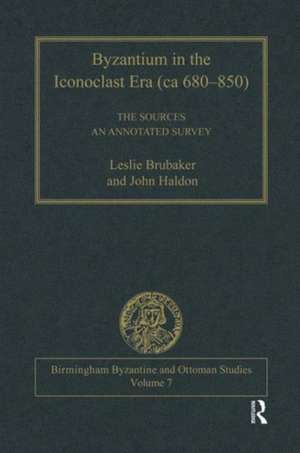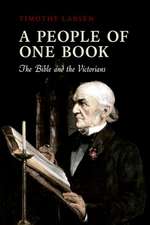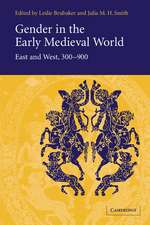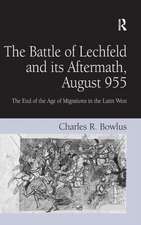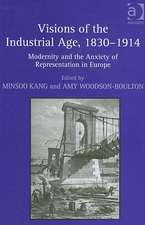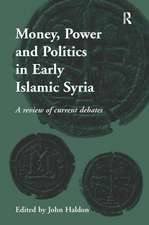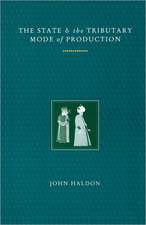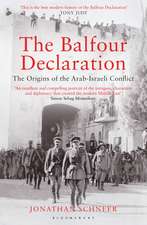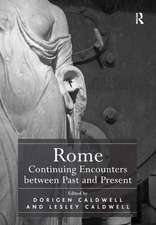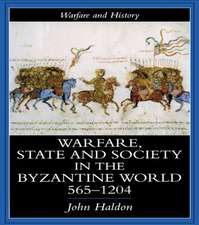Byzantium in the Iconoclast Era (ca 680–850): The Sources: An Annotated Survey: Birmingham Byzantine and Ottoman Studies
Autor Leslie Brubaker, John Haldonen Limba Engleză Hardback – 10 sep 2001
Din seria Birmingham Byzantine and Ottoman Studies
-
 Preț: 388.46 lei
Preț: 388.46 lei -
 Preț: 325.72 lei
Preț: 325.72 lei -
 Preț: 314.62 lei
Preț: 314.62 lei -
 Preț: 381.98 lei
Preț: 381.98 lei -
 Preț: 397.38 lei
Preț: 397.38 lei - 21%
 Preț: 258.06 lei
Preț: 258.06 lei -
 Preț: 399.29 lei
Preț: 399.29 lei - 18%
 Preț: 1009.91 lei
Preț: 1009.91 lei - 17%
 Preț: 242.74 lei
Preț: 242.74 lei -
 Preț: 373.43 lei
Preț: 373.43 lei - 18%
 Preț: 1003.43 lei
Preț: 1003.43 lei - 23%
 Preț: 328.20 lei
Preț: 328.20 lei -
 Preț: 389.38 lei
Preț: 389.38 lei - 25%
 Preț: 324.16 lei
Preț: 324.16 lei -
 Preț: 404.47 lei
Preț: 404.47 lei - 17%
 Preț: 256.87 lei
Preț: 256.87 lei - 25%
 Preț: 324.16 lei
Preț: 324.16 lei -
 Preț: 398.09 lei
Preț: 398.09 lei - 25%
 Preț: 776.84 lei
Preț: 776.84 lei - 25%
 Preț: 834.82 lei
Preț: 834.82 lei - 27%
 Preț: 766.00 lei
Preț: 766.00 lei -
 Preț: 387.91 lei
Preț: 387.91 lei -
 Preț: 311.41 lei
Preț: 311.41 lei -
 Preț: 469.34 lei
Preț: 469.34 lei -
 Preț: 388.72 lei
Preț: 388.72 lei -
 Preț: 405.83 lei
Preț: 405.83 lei - 18%
 Preț: 1062.31 lei
Preț: 1062.31 lei - 18%
 Preț: 1004.72 lei
Preț: 1004.72 lei - 30%
 Preț: 873.95 lei
Preț: 873.95 lei -
 Preț: 489.26 lei
Preț: 489.26 lei
Preț: 771.95 lei
Preț vechi: 1107.33 lei
-30% Nou
Puncte Express: 1158
Preț estimativ în valută:
147.73€ • 160.41$ • 124.09£
147.73€ • 160.41$ • 124.09£
Carte tipărită la comandă
Livrare economică 22 aprilie-06 mai
Preluare comenzi: 021 569.72.76
Specificații
ISBN-13: 9780754604181
ISBN-10: 0754604187
Pagini: 392
Dimensiuni: 156 x 234 x 25 mm
Greutate: 0.88 kg
Ediția:1
Editura: Taylor & Francis
Colecția Routledge
Seria Birmingham Byzantine and Ottoman Studies
Locul publicării:Oxford, United Kingdom
ISBN-10: 0754604187
Pagini: 392
Dimensiuni: 156 x 234 x 25 mm
Greutate: 0.88 kg
Ediția:1
Editura: Taylor & Francis
Colecția Routledge
Seria Birmingham Byzantine and Ottoman Studies
Locul publicării:Oxford, United Kingdom
Cuprins
Contents: Introduction; Material Culture: The architecture of Iconoclasm: Buildings; Mosaics and frescoes; Beyond the Empire: The Christian monuments of Syria and Palestine; Manuscripts: Dated Greek manuscripts, 700-850; Undated Greek manuscripts with decoration; Documentary evidence: polemical pamphlets?; Icons: The evidence from Mount Sinai; The Icons; Icons of questionable association with iconoclasm; The evidence from texts; Conclusions; Sculpture (non-architectural): Sculpture in the round: textual evidence; Ivories; Textiles: Introduction; Silks known from written evidence; Preserved representational Byzantine silks; Conclusions; Metalwork; Coins and numismatics: Coins and the economy; Coins: the material evidence; Sigillography: Seals and their value; Seals: the material evidence; Epigraphy; Archaeology; Historical geography; The Written Sources: Historiography and chronography: Introduction; Byzantine texts; Historical and chronicle literature in other languages; Hagiography and related writing: Hagiography: sources and genre; Individual lives; Acts of ecclesiastical councils; Theological and polemical writings: letters, treatises, homilectic literature, hymnography: Individual texts and authors; Other individual writers; Anonymous works; Anti-Jewish and anti-heretical writings; Apocalyptic writing; Letters; Legal texts and literature; Records, official and unofficial documents, works of reference: State documents; Military treatises; Notitiae Episcopatuum; Itineraries and ’geographical’ literature; Lexicographical and bibliographical literature; Non-liturgical verse and epigrammatic literature; Index.
Recenzii
'... insightful annotation and discussion of buildings and archeology, manuscripts [...], icons, sculpture, textiles, metalwork, coins and seals... all Byzantinists should own a copy.' Religious Studies Review '... a necessary, eminently useful, and reliable book... It is admirable in presenting material sources alongside written ones...' Speculum 'This fully interdisciplinary exercise makes a major contribution towards re-evaluating Byzantium's 'Dark Age'.' Journal of Ecclesiastical History
Descriere
Iconoclasm, the debate about the legitimacy of religious art that began in Byzantium around 730 and continued for nearly 120 years, has long held a firm grip on the historical imagination. Byzantium in the Iconoclast Era is the first book in English to survey the original sources crucial for a modern understanding of this most elusive and fascinating period in medieval history. It is also the first book in any language to cover both the written and the visual evidence from this period, a combination of particular importance to the iconoclasm debate. The authors, an art historian and a historian who both specialise in the period, have worked together to provide a comprehensive overview of the visual and the written materials that together help clarify the complex issues of iconoclasm in Byzantium.
